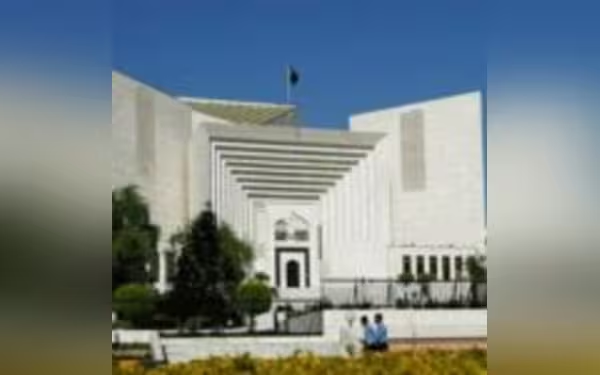Saturday, December 21, 2024 03:50 PM
SC Grants AAG More Time on Audio Leaks Inquiry
- Supreme Court allows AAG more time for directives.
- Inquiry commission has not convened since May 2023.
- Government's stance on audio leaks remains unclear.
 Image Credits: pakistantoday
Image Credits: pakistantodayThe Supreme Court grants AAG more time to seek government directives on the audio leaks inquiry, highlighting ongoing legal complexities.
In a significant development regarding the ongoing audio leaks case in Pakistan, the Supreme Court (SC) has granted Additional Attorney General (AAG) Aamir Rehman additional time to seek directives from the government. This decision was made during a session of the Constitutional Bench on Monday, highlighting the complexities surrounding the inquiry into the audio leaks that have stirred considerable public and political interest.
The audio leaks case has been a contentious issue, with the SC previously ordering the government on November 22 to clarify its intentions regarding the inquiry commission established to investigate the matter. The situation escalated when, on August 19, the SC suspended the Islamabad High Court (IHC) orders related to the case. It was noted that the three-member inquiry commission, tasked with verifying the authenticity of the audio leaks, had not convened since its last hearing on May 27, 2023.
During the recent hearing, all members of the Constitutional Bench were present, except for Justice Ayesha Malik. The federal government requested more time to address the audio leaks case, with AAG Rehman emphasizing the need for a prompt hearing date. He posed a critical question to the court: "Does the government want an inquiry into the audios or not?" This inquiry reflects the government's struggle to address the issue amidst ongoing law and order challenges, particularly following recent clashes between security forces and Pakistan Tehreek-e-Insaf (PTI) protesters in Islamabad.
Rehman assured the court that the audio leaks matter would be presented at the next cabinet meeting, promising to inform the court of the cabinet's decision thereafter. PTI lawyer Babar Awan pointed out that the SC's ruling regarding the legal status of the audio leaks was already available, indicating that the legal framework surrounding the case is becoming increasingly intricate.
Justice Aminuddin Khan remarked that the matter would be reviewed once the government provided instructions to the AAG. This highlights the importance of governmental input in legal proceedings, especially in cases that have significant political implications.
In a related context, the IHC had previously issued a directive on May 29, barring telecom companies from recording phone calls and data for surveillance purposes. This ruling aimed to protect citizens' privacy rights, stating that intelligence agencies and police authorities could not surveil individuals without proper legal procedures. This decision has raised concerns about the ability of law enforcement agencies to effectively monitor criminal activities and potential threats.
As the legal proceedings unfold, the audio leaks case continues to capture the attention of the public and legal experts alike. The implications of this case extend beyond the courtroom, touching on issues of privacy, governmental accountability, and the balance of power between state authorities and individual rights. The outcome of this inquiry could set important precedents for how similar cases are handled in the future, making it a pivotal moment in Pakistan's legal landscape.
The Supreme Court's decision to allow more time for the AAG to seek government directives underscores the complexities involved in the audio leaks case. As the government prepares to address this pressing issue, the public remains watchful, eager to see how the legal system will navigate the challenges posed by this controversial matter. The resolution of this case may not only impact those directly involved but could also shape the future of legal and political discourse in Pakistan.













